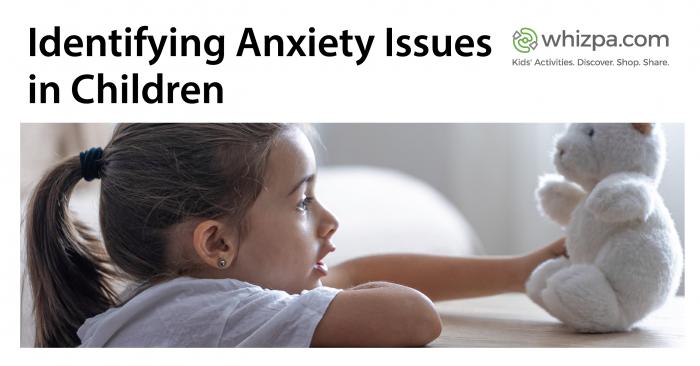
Identifying Anxiety Issues in Children
In today’s day and age, anxiety in children is not something that’s unheard of. Given the umpteen number of challenges they face today – high competition in schools, several extra-curricular activities to manage, the pressure to excel at everything, and prevalence of social media – it is but natural that this uncomfortable feeling has become a normal part of life.
What is anxiety?
Several people tend to use the words “worry” and “anxiety” interchangeably. Are they really the same or is there a key difference? The difference is the magnitude. Anxiety is when one worries so intensely and so often that it becomes difficult to function normally. While worry is something that one can manage by simple methods such as sharing the problem with friends/family, distracting oneself with a hobby, or telling oneself that the downside to it isn’t that grave; anxiety on the other hand can make one seem lose control and a feeling of helplessness can set in. We are talking about fears that can cause distress. This can be in the form of phobias, separation anxiety disorder or social anxiety disorder.
Anxiety has to be taken seriously by parents and carers if they see that anxiety disorder has started to interfere with the child’s friendships, regular tasks at home and work at school. It can make simple tasks seem laborious. A Maths assignment that would take your child 30 mins in normal circumstances can now take 1.5 hours as an example. Or it might get increasingly difficult for the child to go to bed when troubled thoughts dominate his/her mind.
What happens if anxiety is left untreated?
Research indicates that childhood anxiety is a precursor to mental illness in adulthood. Left untreated, it can lead to ongoing anxiety, depression, and even substance abuse. Psychologists indicate that many adults who struggle with anxiety disorders, depression, feeling of hopelessness, and other such mental health problems struggled with childhood anxiety and had it been treated at the earlier stages, it would have saved a lot of trouble in the future.
Kids can also develop unhealthy coping mechanisms if anxiety is left untreated. They would start to avoid situations completely that trigger their anxiety. For instance, if a child gets anxious in a social gathering, they can start making excuses for not attending birthday party invitations or wouldn’t want to get involved in any sport or extra-curricular activity that requires high degree of social interaction. While this mechanism is a short-term fix, over the long term it is detrimental to the child as it reinforces their anxiety patterns instead of helping them get acclimatized to a social situation.
In short, untreated anxiety can lead to low self-esteem, academic dysfunction, low self-confidence, inability to learn new things, and reliance on self-medication through substance abuse.
How to identify symptoms for anxiety disorder?
If you notice a child with the following behavioural issues especially if it’s affecting their ability to function in some way and causes them distress, it is imperative to flag it for help:
- The child may get headaches/ stomach aches, especially when away from their comfort zone (can be home or favoured carer’s location)
- They may feel shaky, short of breath, or tremble with fear
- Anxiety can also cause their hearts to race, faces to flush and hands to become sweaty/clammy
- It is difficult for the child to sleep or they wake up often from nightmares
- They may become clingy or violent if pushed to do certain tasks; it may seem like they are being unreasonable but their fight or flight response gets triggered
- They may be restless/ fidgety in class
What are the reasons for anxiety disorders
- Learned behaviour: if the child has faced extreme criticism, abuse or has lived with anxious parent/parents, witnessed constant fights in family, it can very well translate into a behaviour they have picked from their environment.
- Uncontrollable factors: such as prolonged illness that limits a child’s movement, or death of a loved one, separation from a loved one for extended period of time, divorce/separation of parents, frequently moving house/school can be the trigger
- Genetic: Children may have inherited genes that may cause them become more anxious from parents
What should the parents/carers do to support kids manage anxiety?
- Acknowledge your child’s fears – do not belittle them or ignore pretending it’s not serious; reassure them that you are going to be supportive
- Do not label your child as shy or anxious; it may only make them believe it’s true; children start to internalize what the parents think about them
- Gently nudge and encourage your child to do things they are worried about. Model the same behavior so they have a real-life example to follow.
- Shorten the anticipatory period – if your child is anxious about getting a vaccination (perhaps fear of needles), do not tell them 4 hours in advance and allow them enough time to excessively worry; a couple of minutes before the doctor appointment should do the trick.
- Think things through with the child – if your child has separation anxiety, ask the child what will happen if mom doesn’t come to pick you up. Make it seem like an imaginary scenario. The child might reply “my teacher will call you”. And then what will happen, “will the teacher leave you alone in the classroom?” The child will be forced to think and reply “No, he/she will wait with me until you arrive”. The parent can ask, “how does that make you feel?” and the child might say, “I will be in a safe place.” This mental exercise will give them the assurance needed to start trusting the process.
- If things are still out of control, find a trained therapist and accompany your child to all the therapy appointments and ensure you follow the process diligently
To conclude
For children, some situations are often new, the world is a big place with strange things, and they frequently have to navigate through the world of unknown – no wonder the fear of unknown can set in. While it can be distressing to see our kids feel anxious, it is our responsibility as parents and carers to offer them the best support possible. It may seem humongous a challenge to overcome but thanks to the efforts of researchers and psychologists, anxiety disorders can be defeated. Doing this at the right time will ensure that not only will the kid grow up to be healthy adult, they will be able to use their childhood experiences to help others around them struggling with similar issues.
If you have a success story whereby you helped a child overcome anxiety, do write to us to share how you did it. We’d love to hear!








